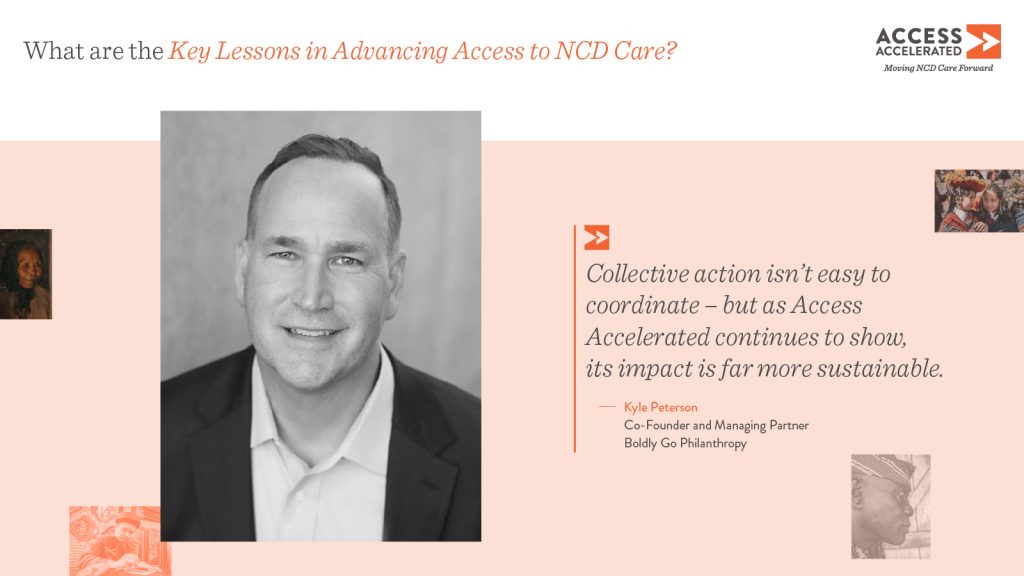Explore the Access Accelerated interview series, where trailblazing leaders, visionary thinkers, and passionate advocates share their bold ideas and innovative approaches for the future of Non-Communicable Diseases (NCDs). These interviews are featured in the six year report, Key Lessons Advancing Access to NCD Care: Collaboration, Connectivity, Community, and offers fresh perspectives and incisive insights as we look to transform the future of access to NCD care.
Boldly Go Philanthropy helps companies and foundations around the world maximize their philanthropic efforts. Co-founder and managing director, Kyle Peterson explains why connectivity and infrastructure are key to coordinating action and making an impact – especially when confronting a problem as complex as NCDs. Below, he sheds light on the changing landscape of partnerships, and why the Access Accelerated model is the way forward in bringing about systems-level change.
When I was working in the field in the mid- 90s, there was a lot more competition and far less connectivity between actors than there is today. Over the past 20 or 30 years, we’ve become a lot more thoughtful about partnerships. There’s a much greater notion of shared responsibility and an understanding that we can achieve greater and more sustained impact by pooling expertise and resources. Improving access to NCD care is such a multi-faceted challenge, so it’s only logical that multiple players should collaborate to solve the challenge. It’s not just about getting medication to patients. It’s about changing mindsets and policies. Suddenly, it’s not so easy for one actor to solve alone.
THE ARCHITECTURE OF A THOUGHTFUL PARTNERSHIP
The act of collaboration isn’t a success in itself; it’s a mechanism to solve a problem. Fundamentally, you need someone to bring the action together, or the collaboration will fail. Cross-sector partnerships are inherently ambitious and simply relying on the value of individual expertise and hoping they complement each other isn’t enough.
Effective partnership demands robust infrastructure to be in place to bring the actors together. You need somebody to articulate your shared goals, collect and disseminate information and data, and measure and communicate your progress. And that takes time, effort and money. What people sometimes forget is that you need to pay for this infrastructure.
It often gets dismissed, when in reality it’s a small investment compared to the intervention that you’re trying to solve. If infrastructure doesn’t get funded, the collaboration fails. And that’s what we see happen over and over again. Collective action isn’t easy to coordinate, but as Access Accelerated continues to show, its impact is far more sustainable than any one actor on their own could achieve.
Effective partnership demands robust infrastructure in place to bring the actors together. What people forget is that you have to pay for this infrastructure.
KEEPING ACCOUNTABLE
Measuring the health of a collaboration allows you to not only take stock of what’s going well but it exposes what’s not working, and that provides an opportunity to course correct. Putting frameworks in place to better understand the impact of investments in collective action holds a collaboration accountable, both from the individual and collective level.
But beyond the traditional metrics, we need to ask ourselves the right questions: What is the attitude of the actors in the collaboration? Do they feel like they are getting value for their investment? Is there trust and open communication? Is there strategic alignment between what we’re doing and the partners’ individual interests? I often ask people, does your CEO know about this collaboration? Does your board know? When the answer is ‘no’, it’s almost always an indication of strategic nonalignment, lack of interest and failure.
LOOKING FORWARD
As Access Accelerated moves into the next phase of its journey, it’s important to maintain a strong connection between the goals of the collective with the individual partners’ own interests to ensure meaningful engagement, sustained action and long-term impact. As the backbone and infrastructure to this collaborative, Access Accelerated has an important role to play in clarifying mutual objectives, defining where it will be in five years, and measuring the health of the partnership to keep itself accountable.
Kyle Peterson is the Co-Founder and Managing Partner at Boldly Go Philanthropy, an advisory firm based in Washington, DC. Before launching BGP, Mr. Peterson led all philanthropic activities on behalf of the multi-generation Walton family, including serving as the Executive Director of the Walton Family Foundation.
Read more interviews in the Access Accelerated report: Key Lessons in Advancing Access to NCD care.
